Program Components & Funding
The MidAtlantic AIDS Education and Training Center (MAAETC) is one of eight DHHS HIV/AIDS Bureau regional AIDS Education and Training Centers (AETCs) that provides training, preceptorships, and technical assistance to healthcare professionals in Delaware, District of Columbia, Maryland, Pennsylvania, Virginia, and West Virginia to support the National HIV/AIDS Strategy (NHAS) and HRSA priorities.
OUR MISSION
- Expand and enhance HIV knowledge and clinical skills of the healthcare workforce in the US to provide comprehensive HIV prevention, treatment, and care
- Improve outcomes along the HIV Care Continuum, including diagnosis, linkage, retention, antiretroviral treatment, and viral suppression through specific training modalities
- Reduce new infections, improve early HIV treatment linkage and care coordination, and integrate behavioral health to improve the care continuum for persons with HIV
OUR WORK
- Identify HIV/AIDS education and training needs of health care professionals in our region
- Work collaboratively within the AETC network, regional networks, and other federal training centers
- Create and support partnerships and capacity-building opportunities with health care organizations providing patient care at the local level
- Works collaboratively with state and local government agencies in HIV and other public health-related initiatives
- Train and provide technical assistance to health care professionals, interprofessional health teams, and health care organizations on the prevention, diagnosis, and treatment of HIV, including: opportunistic infections, hepatitis, noninfectious diseases associated with HIV, sexually transmitted infections, oral health, and co-occurring substance use and mental health disorders
FOUNDATIONS OF HIV (FH) TRAINING GOALS
To develop and implement HIV training for primary and non-primary care, low-volume, and novice providers to increase awareness of HIV, the epidemic, prevention, screening, linkage to care, and knowledge about cultural competency.
CAPACITY AND EXPERTISE EXPANSION (CEE) TRAINING GOALS
To provide interactive education and clinical training to expand the knowledge and skills of healthcare team members involved in HIV prevention, care, and treatment.
PRACTICE TRANSFORMATION PROJECT (PT) TRAINING GOALS
To increase the capability of organizations to implement system-level changes to transform clinical practice at FQHCs and RWHAP-funded agencies with process improvement, training, and technical assistance that support NASC and HRSA priorities to achieve patient-centered practice and improved health outcomes.
INTERPROFESSIONAL EDUCATION PROJECT (IPE) TRAINING GOALS
To develop and disseminate interprofessional education for health professional schools, graduate programs, and faculty to improve access to quality comprehensive HIV care within the context of IPE based on domains (roles, communication, values, teamwork) supporting the NHAS and the HIV Care Continuum.
ENDING THE HIV EPIDEMIC (EHE) TRAINING GOALS
Address the unique training needs of the health care workforce and organizations in EHE-funded jurisdictions (including Baltimore - Baltimore City, Prince George's County & Montgomery County, Philadelphia - Philadelphia County, and Washington D.C.) by providing training and technical assistance (TA) regarding End the Epidemic Key Strategies of diagnose (HIV testing, linkage), treat (HIV care, HIV treatment), prevent (PrEP/PEP), and respond (localized response to identified clusters of outbreaks of HIV).
MINORITY AIDS INITIATIVE (MAI) TRAINING GOALS
To provide education, training, and technical assistance to increase competencies of minority-serving healthcare team members, facilities, and organizations; expand the number of minority-serving healthcare professionals (HCPs) with treatment expertise and knowledge of HIV prevention, treatment to increase access to care for adults, adolescents, and children with HIV varied racial/ethnic backgrounds and underserved individuals/groups.
CENTER HEADQUARTERS
The MAAETC headquarters is located at the Department of Infectious Diseases and Microbiology, School of Public Health, University of Pittsburgh in Pittsburgh, Pennsylvania. The University of Pittsburgh is responsible for overall direction, monitoring, and evaluation of the MidAtlantic AIDS Education and Training Center in meeting the requirements of the HRSA, HIV/AIDS Bureau.
Linda Rose Frank, PhD, MSN, ACRN, FAAN
Principal Investigator and Executive Director
University of Pittsburgh, School of Public Health
Department of Infectious Diseases and Microbiology
130 DeSoto Street
Pittsburgh, PA 15261
Phone: 412-624-1895
Website: www.maaetc.org



